Remembering my World War Two fiance
- Published
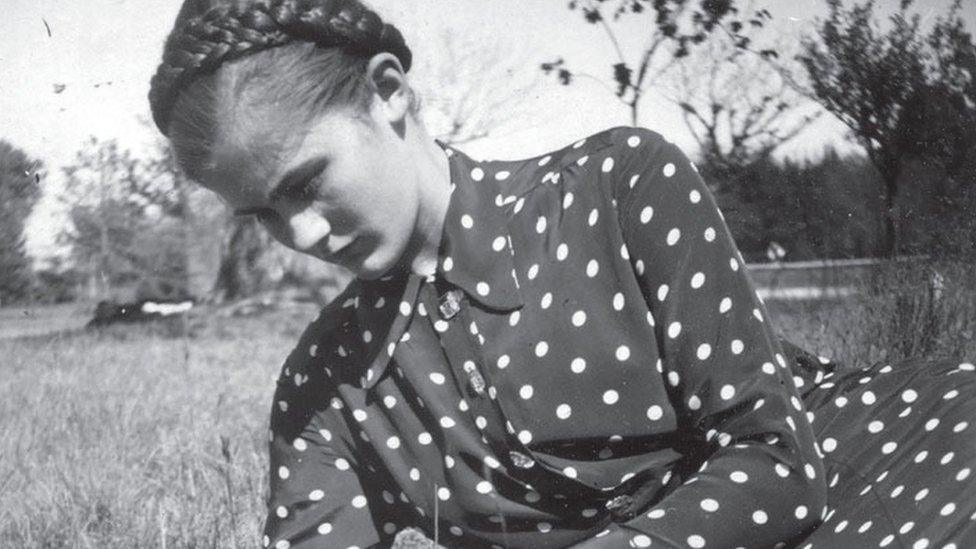
Jenny aged 18
Jenny Nater met Eric Cornish in Dover in 1941 when she was 21 and he was 26. War was raging and neither wanted to fall in love. But their romance flourished by letter - and Nater, now 96, carried on writing after Cornish went missing at sea.
I was invited to have a drink with some young officer, I don't remember his name. And I sat next to this young man with very blue eyes and the most extraordinary beautiful hands.
I said, rather cheekily: "You've got beautiful hands. What do you do with them?"
And he made a sort of ironic grin and said: "I'm a butcher."
His name was Eric Cornish. He was 26. His father worked at Smithfield meat market in London, which is why he joked about butcher's hands.
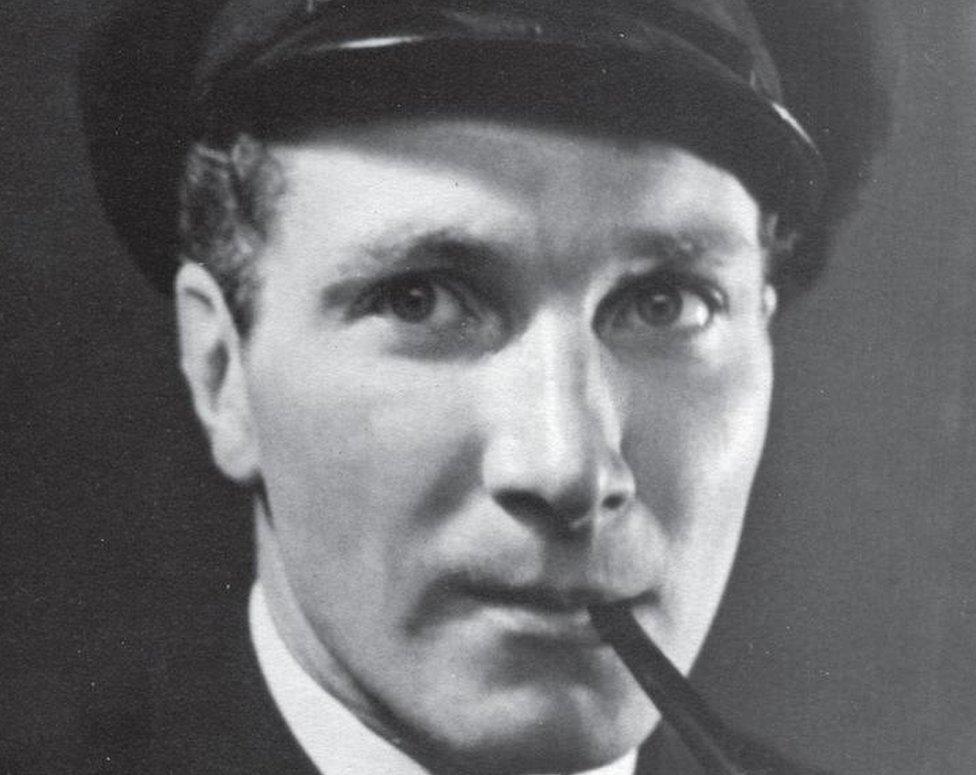
Lt Eric "Rick" Cornish, 1941
He had studied economics at the London School of Economics before joining the Navy and now he captained motor torpedo boats sent out to take on German warships in the Channel.
I worked for the Navy, listening in on high-frequency radios to surface craft in the German navy in Channel - I'd gone to school in Switzerland so was fluent in German.
He was sent to Portsmouth, and started writing me rather formal letters, signing them with his full name and rank.
And then, gradually, his letters became more interesting - he became interested in me. I don't quite think he realised how young I was. So I began to know the man.
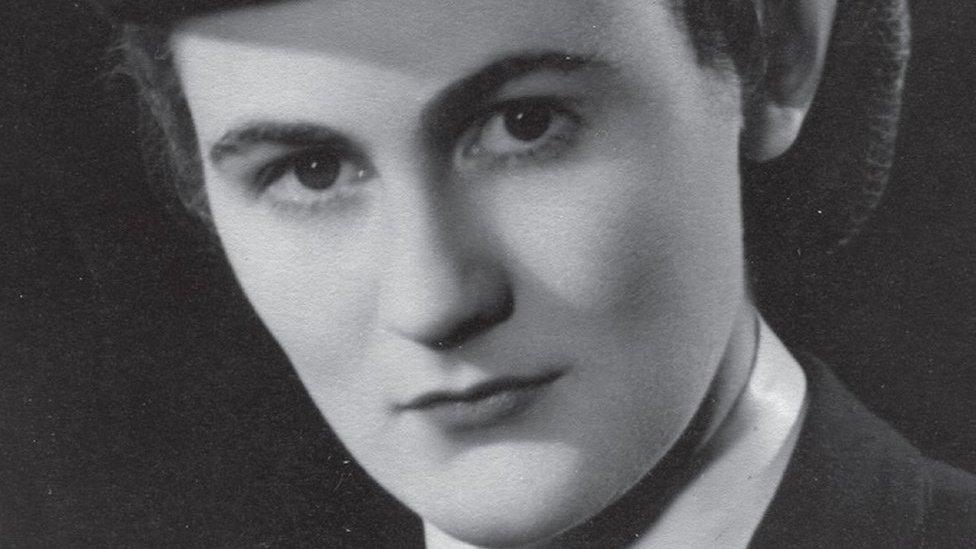
And then he wrote me this fairy tale about this poor fellow that lived in a hovel and dreamed about walking over the hills and sailing on the seas with a presence always beside him. He didn't see her face, but she was always there. Suddenly, one day, a princess was outside.
And he said: "Now I've found her."
We began to see each other quite a lot - and not too slowly, fairly rapidly. I began to call him Rick.
25 November 1941
I was rather shocked when you asked me if I still wanted to marry you, for I told you once before, originally, when you had so much against it, that I wanted to marry you but that it was up to you and I would not mention it again…
The other obstruction, the war, I can understand for I think there is a big risk in wartime of things going wrong and unfortunately it is you that the risk falls upon.
Rick
My father used to say: "Jenny, never get married until you could say to yourself I cannot live happily without this other person."
I was frightened of marriage, and Rick knew that, because of my parents' divorce.
I certainly had no faith in myself marrying and ever having children - I couldn't imagine it, until I got to know Rick and everything slowly changed.
I became a new person.
25 November 1941
How poor a thing is memory compared with reality. I am remembering that I kissed you that I couldn't hold you any tighter… Oh Lord, for the reality.
Rick
PS. By the way did I mention that I loved you.
I felt for the first time in my life totally protected and enveloped by his love. I'd never felt like that before.
Every meeting was intensified. You know, it was sometimes no more than half an hour.
But we saw each other literally every third day - and if we didn't see each other, we wrote a letter.
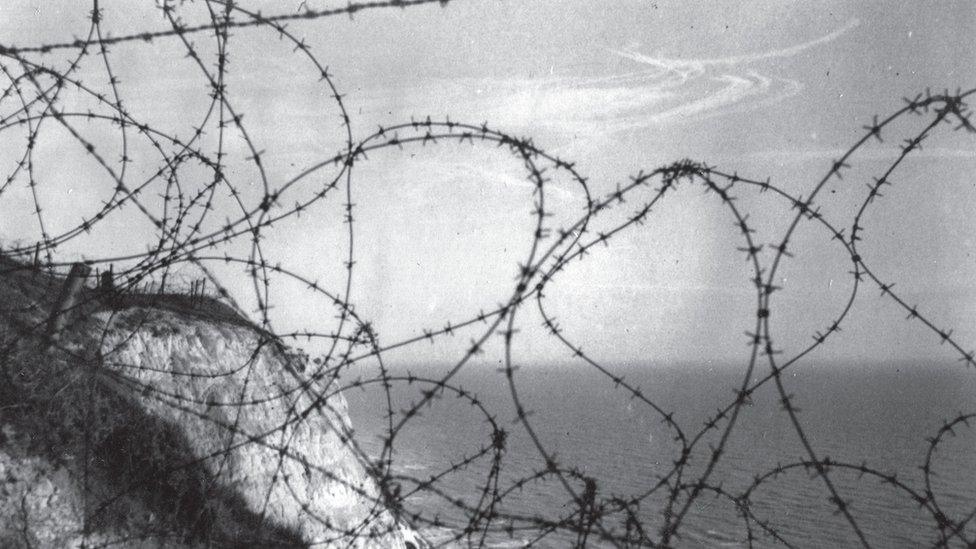
A dogfight over wartime Dover
7 December 1941
I wanted to ring you up as soon as I heard the news about the commencement of hostilities against Japan.
It would have helped to be with you because there is a strange feeling of not facing the world except with you. And in a world of death, life has come to mean so much now...
I feel that the prospect of a real marriage to you is put off even further by these new imbecilities so that I want to act as though you were my wife and not bother about the formalities. I don't mean that in any vulgar sense - that I want to rush off and go to bed with you (though I would like to do that).
Rick
People find it hard to believe we were never actually lovers. We were in love and couldn't have been closer. But in war you have to think very hard. I mean, it was way before the pill or anything like that.

Find out more
The first part of Jenny Nater's interview with Jennifer Tracey was broadcast on BBC Radio 4's iPM on 5 November. You can listen again on iPlayer.
The second part was broadcast at 05:45 on Saturday 12 November. You can listen again and download the iPM podcast here.
A shorter version of the full interview was broadcast on PM on Thursday 10 November. Listen again.

You certainly didn't imagine it was a good idea to have a baby because you never knew what was going to happen.
28 December 1941
I feel the need urgently for some place to be with you alone - remote for a time from the world and the people in it. I don't think that in wanting that I am running away from reality.
It is the one thing I want all the time. To be with you. Never to be away from you.
Rick
He was a brilliant economist and his ambition was to be in what was then the League of Nations [a forerunner of the UN]. His other ambition was to buy a Lunenburg schooner ship and sail it around the world. That was his dream.
When we finally became engaged, I gave him a big silver cigarette case and in it I wrote: "To the captain from the crew," because I was supposed to be crewing this schooner all by myself.
That was, alas, stolen many years later when my house was broken into. A lot of things were stolen but that's really what hurt me most.
March 1942
It scares me that you should seem so insistent about losing me… It isn't often given to two people to love one another as we do and I think we should be grateful for that and not worry - for it will make us sick. I always say Jenny is somewhere in the world and she is thinking of me now as though we were together - time and distance in themselves are only material things…
Rick
Normally I would always listen for the engines of the boats going to sea when Rick was on duty. One night I wasn't listening, because I knew he wasn't on duty.
But this huge convoy was seen coming through the channel, so they sent him up with his flotilla. The German convoy was huge.
It was the largest battle in the Channel up to that date. His boat went down. It was awful.
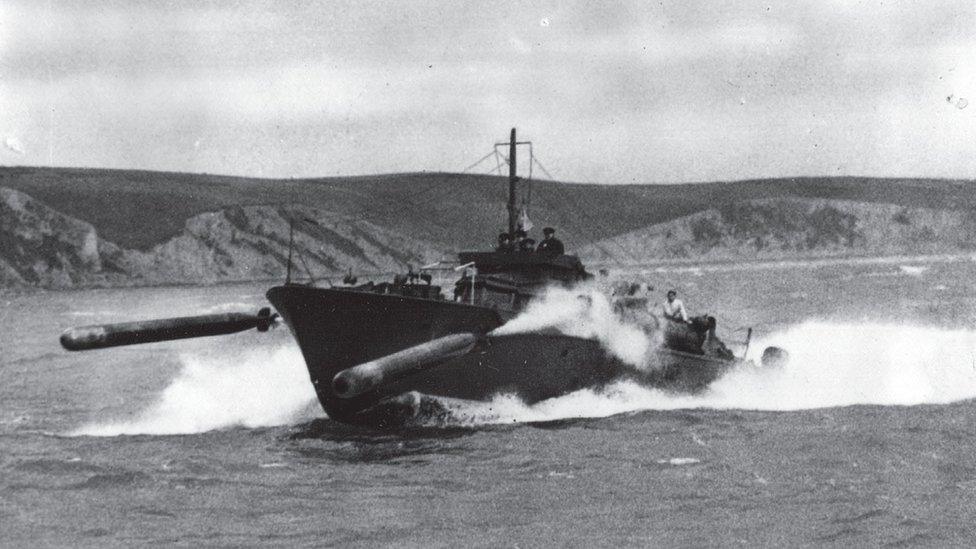
An MTB like the one commanded by Rick
There was a signal from a German minesweeper or mine-layer. It said: "We have on board the captain of" - something - "boat" - the name before "boat" we never got.
I thought: "It must be Rick, it must be."
I convinced myself that he was either a prisoner of war or he was somewhere in France making his way back, which a lot of them did - that he had survived.
14 May 1942
My dearest heart. It is still very hard for me to believe that you are gone away. I suppose the reason for that is that you really never will be gone and I shall always be with you... How can I express this ineffable love I have and how can I tell you that outside of you there is nothing that matters - I love you Rick and wait for the first word from you.
Jenny
Most people, if they were lost in a battle like that, we'd hear within two months at most.
I was convinced if I wrote to him every day that he would be a prisoner.
I never, never, never gave up hope.
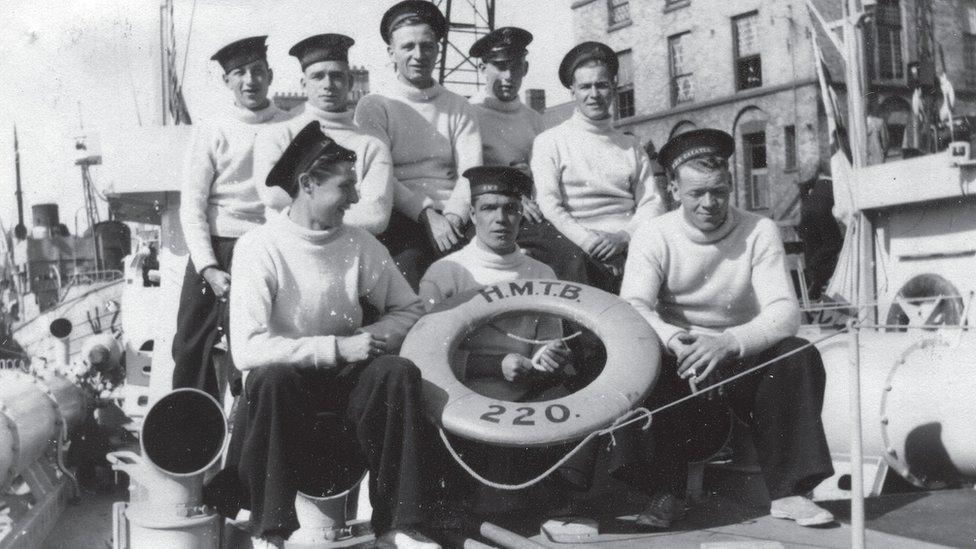
The crew of Rick's boat before it was on lost on 13 May 1942
May 1942
As you know this is the longest time we have ever been apart, two weeks have now elapsed and I'm not sure I can sanely live without you. If I knew you were alive I could plan the future but I don't even know that. You come between me and the written page of any book I try to read, the words on the sheet of paper I try to write. And you are constantly, vividly in my head.
Jenny
Some of my letters may make me weep today. I just can't read them. Agony. It was agony.
They are real cries from the heart, my letters. We had never really seen each for other any peaceful protracted time until we managed to go away for five days to Itchenor, Hampshire, and that was just before he was lost. Anyway, we had five miraculous days together.
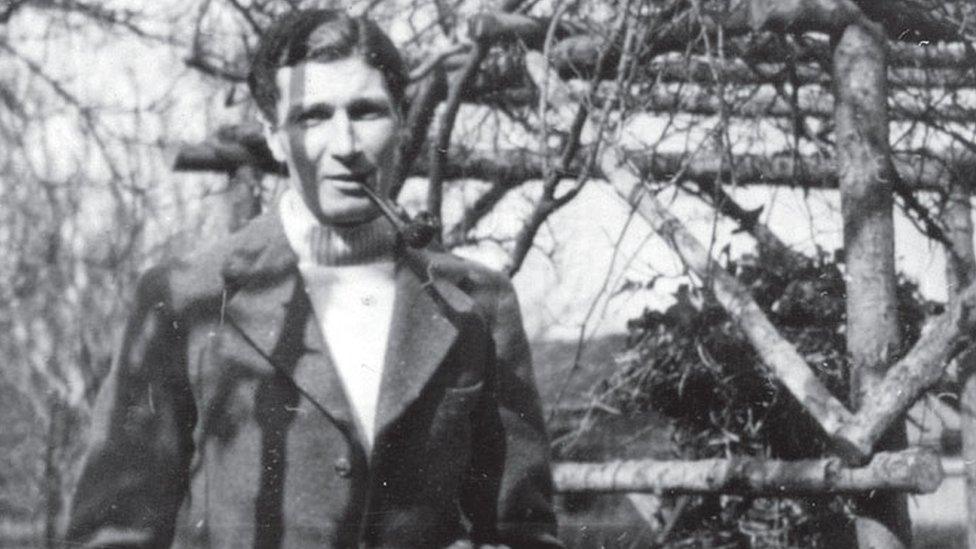
Rick in Itchenor
May 1942
Do you remember the train journey back from Itchenor? I shall never forget it. How you sat in the sun and suddenly began to talk with your eyes wide open in happiness - and I was so happy I could only laugh for joy… I do not understand how I am lucky enough to have you loving me. What can I say? I can only pray that it is not too long for me to bear.
Jenny
I never dared write him a real love letter because can you imagine being a prisoner of war and knowing that you wouldn't be seeing the person for several years? There's no point in doing so.
Many weeks later the Navy returned Rick's belongings to his family on the assumption that he would never return.
The thing that worried us was that his kapox suit, which was the life suit, was in his kit. I had a vision of him just floating, badly wounded, just trying to get through the water with his hands, determined to reach the shore somehow, determined to get back.
10 June 1942
Life and its trivial daily details goes on despite the fact that the earth has ceased to spin, the sun to shine and night and day to alternate.
Jenny
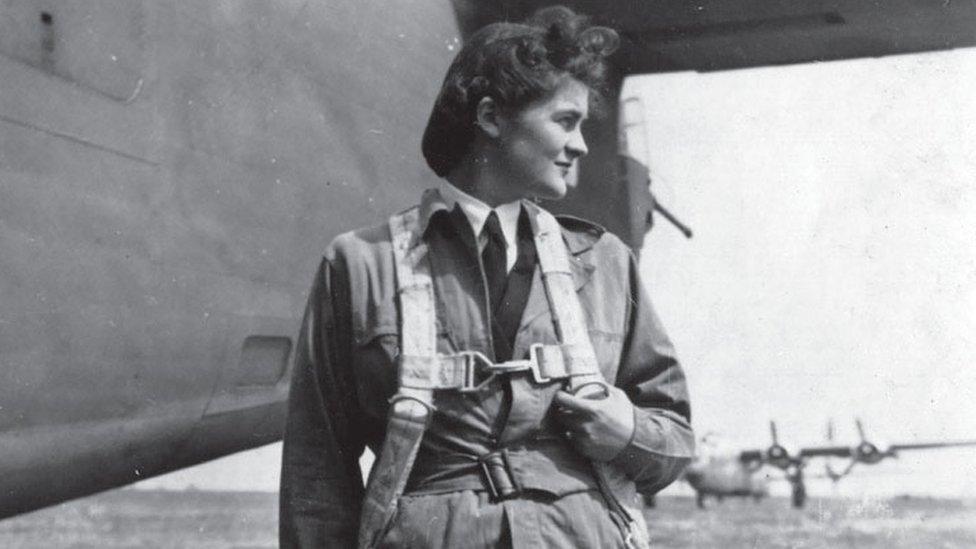
Jenny at a US bomber base near Norwich, 1943
War is still to me the ultimate obscenity.
One of his crew wrote to me from a prisoner of war camp and said Rick was hit in the face and went below decks to scupper the boat if it was beyond saving.
23 July 1942
My darling, there is a lovely moon shining on the sea tonight but I cannot love the sea anymore. It is so pitiless and I am afraid for you when I look at it. My love and my need for your safety seem insignificant before its vastness.
Jenny
I suppose by the end of 1946 I accepted Rick was gone. But even then I'd wake up in the night in floods of tears.
That year Jean Nater asked me to marry him. He had had a tough war working as a secret agent.
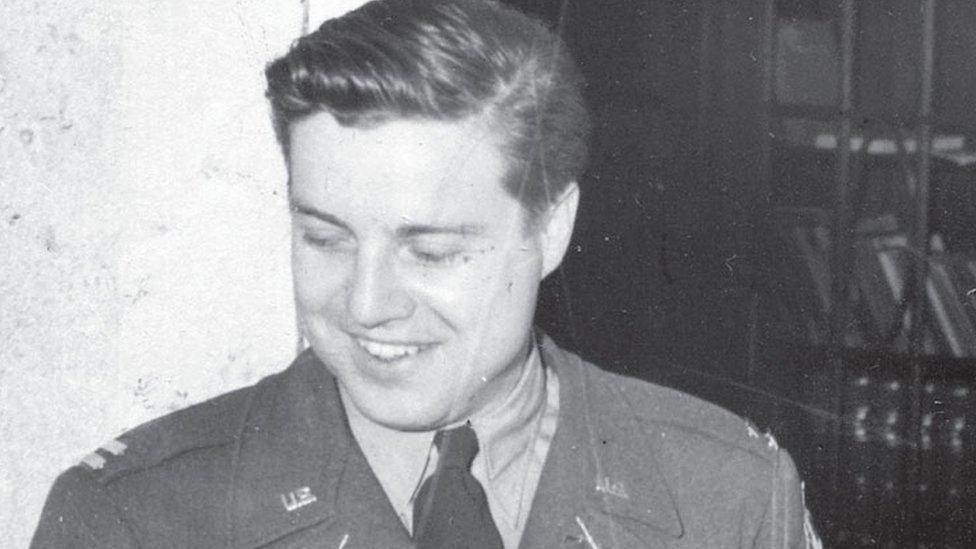
Jean Nater
I wrote to poor Jean and I said: "I cannot marry you, Jean, because I just wake up in the night weeping for Rick and it's not fair."
I've got his letter saying: "Don't ever say anything like that again. Your sadness is part of the Jenny I love." And he couldn't have been more understanding and more wonderful.
He knew everything about it. I didn't hide anything from him. It was an incredibly painful time.
But we married and it was a good relationship. I have four children, 10 grandchildren and my first great-grandchild has just been born.
My letters to Rick stopped in 1946 and I didn't look at them again until a year after Jean died in 2011.
The two men shaped my life.
I love them both. But Rick will always be… I suppose it was my first. Losing Rick has been a very real and recurring sadness in my life. I will always love him. I was very lucky. And I know it.
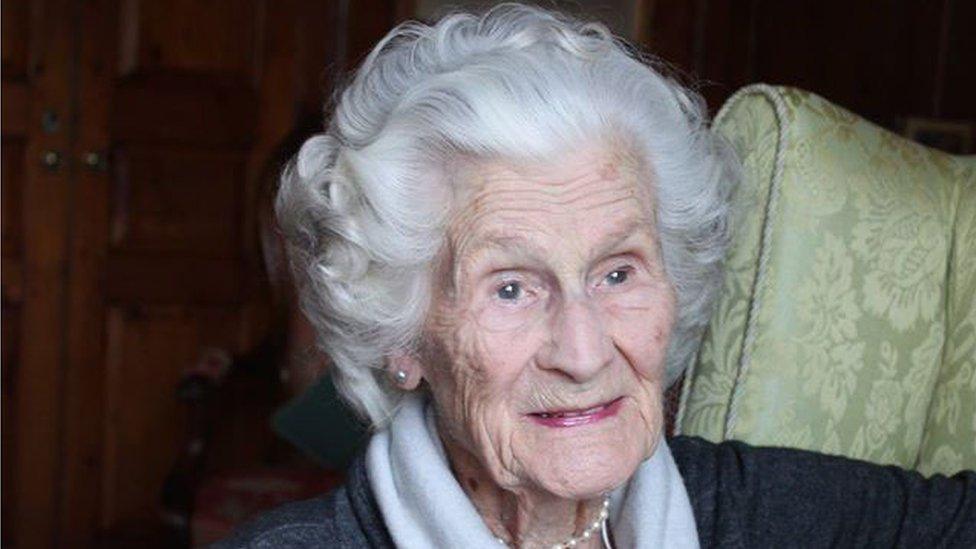
Jenny today
Jenny Nater's memoir, Secret Duties of a Signals Interceptor, will be published later this month.
Join the conversation - find us on Facebook, external, Instagram, external, Snapchat, external and Twitter , external